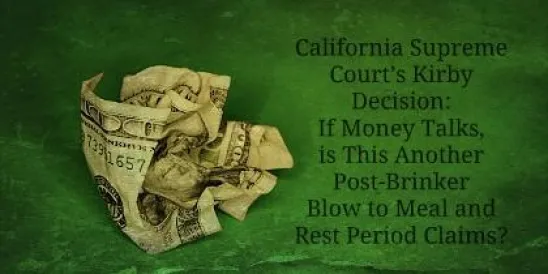On April 30, 2012, the California Supreme Court issued a decision holding that the fee shifting provisions of California Labor Code sections 128.5 and 1194 do not apply to claims for wages made pursuant California Labor Code section 226.7 for failure to authorize meal and/or rest periods. Kirby v. Immoos Fire Protection, Inc., ____ Cal. 4th ___ (2012).
The Court quickly disposed of the argument that Section 1194’s prevailing plaintiff fee shifting provision applies to Section 226.7 claims because Section 1194 pertains to payment of minimum wages and overtime, an issue not implicated in meal and rest break cases. The Court then considered the applicability of Section 218.5’s prevailing party fee-shifting provision. The Court focused on the requirement of Section 218.5 that, in order to be within its reach, the claims must be one for “the nonpayment of wages.” The Court held, however, that the crux of a meal/rest period claim is not for “nonpayment of wages,” but is for “the non-provision of meal or rest periods.” The Court found that the wage payment due upon a finding of liability is the remedy, but not the basis for liability. As such, the Court concluded, Section 218.5 was not intended to apply to meal and rest break claims, and that such claims, when pursued pursuant to Section 226.7, must “be governed by the default American rule that each side must cover its own attorney’s fees.”
Also significant is what the Court did not decide. First, the Court did not hold that no claim based on meal and rest period violations can be subject to a fee shifting provision. For example, the California Private Attorneys General Act (“PAGA”) may apply to meal and rest period violations, and contains a one way a fee shifting provision, found at Labor Code section 2699(g)(1). Accordingly, though the Kirby decision may diminish incentives to the plaintiffs’ bar to file meal and rest period class actions, fee-shifting incentives still remain if pled under PAGA. Plaintiffs’ attorneys no doubt will argue that the legal effort employed by them to pursue a PAGA meal and rest periods claim overlaps with the legal effort employed by them to pursue a meal and rest period claim under Section 226.7. As such, they will argue, they are entitled to full recovery of fees for the time they employ on meal and rest period claims, if they prevail on PAGA claims premised on that theory. Of course, the limitations period on PAGA claims is significantly less than the limitations period on wage claims.
Second, the Court did not decide the meaning of the phrase “action” as found in Section 128.5. That Section provides, in part: “This section does not apply to any action for which attorney’s fees are recoverable under Section 1194.” The Plaintiff argued that the term “action” as used in Section 128.5 meant that the one-way fee shifting provisions of that statute will not apply in any action in which a claim embraced by Section 1194 is pled, even if individual claims in that lawsuit would otherwise be governed by the two way fee shifting provisions of Section 128.5. In the final sentence of its decision, the Supreme Court expressly declined to reach that issue, stating: “we do not address plaintiffs’ argument that, when a suit includes claims covered by section 1194, the entire suit is shielded from attorney’s fees under section 218.5.” Should the plaintiffs’ bar make a concerted effort to capitalize on this ambiguity to try to avoid valid fee shifting provisions in favor of employers, the California Supreme Court may be asked again, and soon, to resolve this issue.




 />i
/>i

